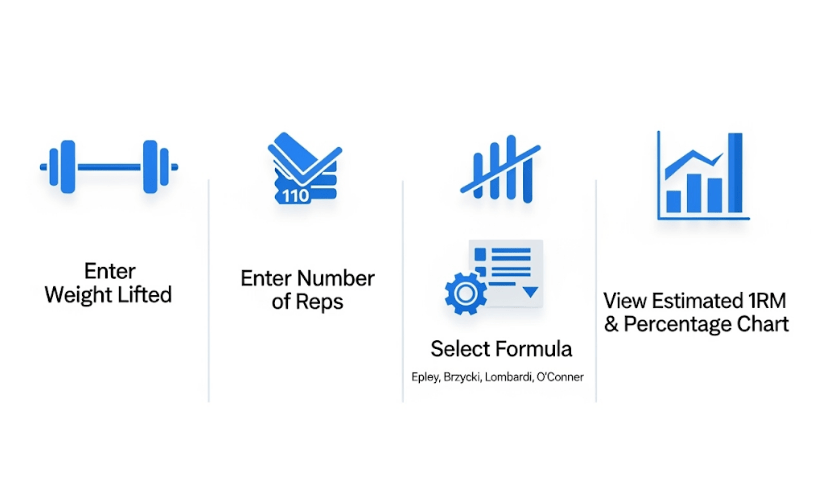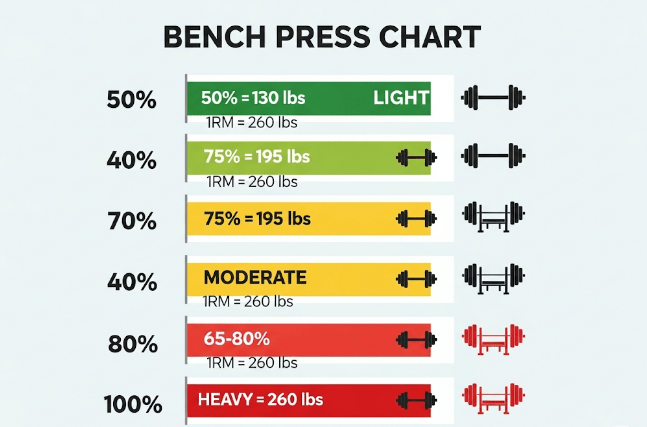Whether you’re a beginner at the gym or an experienced lifter chasing a new personal record (PR), knowing your bench press max can be a game changer. Our Bench Press Calculator is here to make that process quick, simple, and accurate — without needing to load the bar to your absolute limit.
Instead of guessing or risking injury, you can enter the weight you lifted and how many reps you did, and the calculator will estimate your one rep max (1RM). This number tells you the heaviest weight you can push for a single repetition — a key stat for tracking progress and setting training goals.
Best Free Max Bench Press Calculator Online
Why Use a Bench Press Calculator?

The bench press is one of the most popular and widely recognized strength exercises. But there’s a problem: testing your maximum bench press the traditional way means lifting as heavy as possible in one rep. That’s tough on the joints, risky for the shoulders, and not always practical if you don’t have a spotter.
With a bench press max calculator, you don’t have to guess — and you don’t have to max out in the gym every week. Just enter your best set (weight × reps), and the calculator will do the math using proven strength formulas like Epley, Brzycki, Lombardi, or O’Conner.
Benefits of using this tool:
- Stay safe — no dangerous max attempts without a spotter
- Track progress without heavy fatigue
- Plan workouts based on accurate percentages of your 1RM
- See your PR growth over weeks or months
- Compare variations like incline bench press or dumbbell bench press
How This Bench Press Calculator Works
This calculator estimates your 1RM (one rep max) using formulas tested by strength coaches over decades. You choose a formula (Epley, Brzycki, Lombardi, O’Conner), enter your set weight and reps, and instantly see your estimated max.
For example:
- You bench 225 lbs for 5 reps
- Using the Epley formula, your estimated max = 225 × (1 + 5 ÷ 30) = 262.5 lbs
This means that, in theory, you could lift around 262 pounds for one rep.
The tool also gives you a percentage chart so you can plan workouts at 70%, 80%, or 90% of your max — perfect for strength cycles, hypertrophy training, or peaking for a competition.
How to Use the Bench Press Max Calculator
- Enter the weight lifted (barbell or dumbbell equivalent)
- Enter the number of reps completed (up to 20)
- Select your formula (Epley is a good starting point)
- Click “Calculate 1RM”
- View your estimated one rep max and training percentage chart
💡 Tip: Use your most recent, properly executed set for the most accurate result.
Bench Press Chart

Bench Press Calculator Variations
This tool isn’t just for the flat barbell bench press. You can also use it for:
- Incline Bench Press Calculator – Estimate your max for upper chest focus
- Dumbbell Bench Press Calculator – Convert dumbbell weight to barbell equivalent
- Push Ups to Bench Press Calculator – Estimate barbell strength from push-up performance (approximation)
- Bench Press Calculator by Age – Compare your numbers to age-group averages
- Bench Press PR Calculator – Track and beat your personal records over time
Why 1RM Matters in Training
Your 1RM is more than just a number. It’s the foundation for smart programming. Strength coaches often base training percentages on your one rep max:
- 60–70% of 1RM → endurance & hypertrophy
- 75–85% of 1RM → strength building
- 90%+ of 1RM → max effort & neural adaptation
By knowing your 1RM, you can program sessions with precision, avoid burnout, and ensure progressive overload without guesswork.
According to the American Council on Exercise, knowing your one rep max isn’t just about bragging rights. It’s a proven method to set safe, effective training loads and to measure progress over time. By basing your workouts on a percentage of your 1RM, you can build strength steadily while avoiding overtraining.
Common Questions About the Bench Press Calculator
How accurate is this max bench press calculator?
It’s an estimate based on mathematical formulas. While it’s very close for most lifters, factors like technique, rest, and muscle fiber type can affect your real-life max.
Can I use it for dumbbell bench press?
Yes. Just total the weight of both dumbbells and input that number. You can also use our dumbbell to bench press calculator for quick conversion.
What’s the safest way to find my max?
Instead of testing a single heavy rep, lift a moderate-heavy weight for multiple reps and let the calculator estimate your max.
Does age affect bench press max?
Yes. Recovery, muscle mass, and joint health change over time. Our bench press calculator by age can give you realistic targets for your group.
Can it be used for incline bench press?
Absolutely. Just input your incline bench numbers. Your incline 1RM will usually be lower than your flat bench press 1RM.
Understanding the Formulas
Different formulas suit different lifting styles:
- Epley Formula:
Weight × (1 + Reps ÷ 30)– works well for low-to-moderate reps - Brzycki Formula:
Weight × 36 ÷ (37 - Reps)– accurate for higher reps - Lombardi Formula:
Weight × Reps^0.10– popular with powerlifters - O’Conner Formula:
Weight × (1 + Reps ÷ 40)– conservative estimate
You can test all four to see which matches your gym results best.
From Bench Press Calculator to Training Plan
Once you know your 1 rep max, you can structure your workouts with precision. For example:
| Training Goal | % of 1RM | Sets × Reps |
|---|---|---|
| Strength | 80–90% | 4×4, 5×3 |
| Hypertrophy | 65–75% | 4×8, 3×10 |
| Endurance | 50–60% | 3×15, 4×12 |
Your percentage chart from the calculator makes this easy — no manual math required.
Once you know your bench press 1RM, you can apply the same principles to other lifts. Our 1 Rep Max Calculator works for squats, deadlifts, and more. And if you’re ready to push your limits, the Progressive Overload Planner will help you structure sessions for steady, safe gains.
Extra Tips for a Bigger Bench Press
- Warm up with lighter sets to protect your shoulders
- Keep your feet planted and back slightly arched for stability
- Engage your lats and keep elbows tucked at 45°
- Use progressive overload — increase weight slowly over time
- Train accessory muscles like triceps, shoulders, and upper back
Final Thoughts
The Bench Press Calculator is more than a fun tool — it’s a training companion. Whether you’re figuring out your max bench press, planning percentages for a new cycle, or chasing a PR, this calculator saves you time, keeps you safe, and gives you numbers you can trust.
Instead of wondering, “How much can I bench?” you’ll know — and you’ll be able to plan your workouts like a pro.
Ready to see your true strength?
Enter your numbers above and let the Bench Press Calculator show your potential. Train smarter, lift safer, and break those records.